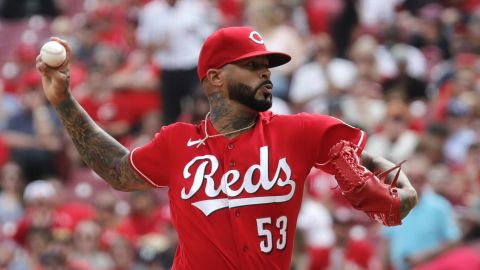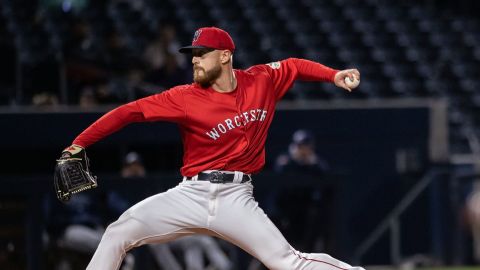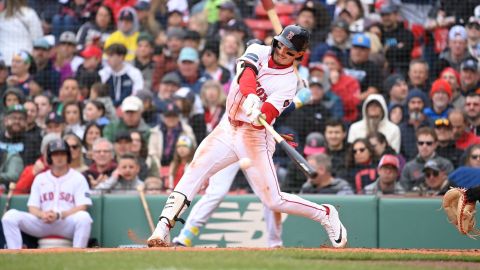 Well, one thing should be obvious in this trade: At the
Well, one thing should be obvious in this trade: At the
center of everything was Adrian Gonzalez.
The Dodgers took on Carl Crawford and Josh
Beckett — and, of course, their multimillion dollar salaries — to get
Gonzalez. The Red Sox gave up the first baseman to rid
themselves of the $31.5 million owed to Beckett in 2013-14, and the $102.5
million owed to Crawford from 2013 through 2017.
So, now the (multi)million-dollar question: Was getting rid of Crawford and Beckett worth giving up Gonzalez?
That depends how you value payroll flexibility in 2012.
Red Sox general manager Ben Cherington freed up a ton of cash in this
deal, jettisoning about $270 million in total contracts. Los
Angeles now gets the distinction of owing about $85 million a year through 2017 to just four players — the other two being Matt Kemp and Andre
Ethier.
As I recently wrote, having so much money
tied up in so few players was a hindrance for the Red Sox going forward. Teams don't take on huge contracts
of underperforming stars through trades much anymore — so either the Dodgers
and general manager Ned Colletti are nuts, or crazy like a fox. We'll see.
Nonetheless, while the Red Sox are glad to be rid of
the money owed to Crawford and Beckett, will the team be able to live up to its "compete every year"
credo after letting Gonzalez go? Replacing his production in the near
future won't be easy.
It's basically become something of a legend that the Red
Sox built their two championships on undervalued players and minimal contracts,
thanks to the keen acumen of then-GM Theo Epstein. Yeah, right.
The 2004 and 2007 versions of the Red Sox were built on
nearly as many high-priced veterans as the current unit. David Ortiz and Kevin
Youkilis may have come to the organization as overlooked castoffs, but Curt
Schilling, Manny Ramirez, Pedro Martinez, Johnny Damon and Co. were all
well-paid stars, so can we please put to bed the myth that team philosophies
were mostly responsible for all that success? The Red Sox paid a premium for their
wins.
And that hasn't changed in 2012 — if anything, building a team through the farm system and "market
inefficiencies" has only become more difficult. The Tampa Bay Rays may be the exception that proves the rule,
but the Red Sox could be looking to take a similar approach with similar results in 2013.
In theory, the Red Sox are setting themselves
up with the ability to move more freely and have more flexibility, but since this trade feels much more about a change in philosophy than a
condemnation of the players involved, don't expect the Red Sox to be jumping in
headfirst to the free agent market this offseason to replace these losses.
Moreover, the existing options on the market shouldn't look too appealing for
Boston.
So do not expect any immediate high-impact help via free
agency.
The other problem for the Red Sox is twofold: Almost every
team across Major League Baseball has caught up to Boston's player development
and player evaluation strategies.
Remember the second-to-last scene in the film Moneyball, when Red Sox owner John
Henry tells Brad Pitt — uhm, Billy Beane — that any team that isn't
incorporating the general manager's theories of statistical analysis into
player evaluation is a "dinosaur"? Well, all those clubs have well entered the
next stage of evolution, as every team across MLB has caught on to the basic philosophy that advanced metrics are important.
Obvious market inefficiencies
in baseball are rarer than they used to be, so the Red Sox have no real advantage
over the rest of baseball in finding those diamonds in the rough. Nor does the
team have an advantage in player development, as all MLB teams have gotten the
memo that it's integral to be able to graduate your own players to the majors
and keep them under team control and cheap contracts while they're in their
waxing-talent years. More money is being put into the amateur draft than ever
before.
If a market inefficiency does exist in 2012, it may be that the long-term contract is undervalued at this point.
While teams eschew big-time deals for payroll flexibility, those clubs willing
to take the leap get to enjoy premium production from premium players — even if
it's at a premium price.
The Red Sox can afford
to take on more payroll than almost all MLB teams, but unlike the days
before the luxury tax, there's a ceiling to how much teams can
spend, and although it's an adjustable one, going too high has real consequences — even for a team with pockets as deep as Boston has.
So is it a boon that the Red Sox get to shed themselves of
the contracts of Beckett and Crawford? Absolutely. Beckett was underperforming, and his presence was a day-to-day distraction, while Crawford,
speed notwithstanding, probably never had a good enough bat to justify his
contract. And, again, the Red Sox get to shed a lot of money.
That being said, this trade all comes down to Gonzalez, what he meant to the Red Sox and what he'll bring to the Dodgers. In
the end, a player who had
been Boston's white whale — so lauded for his metrics and for a swing that
was often referred to as "tailor-made" for Fenway Park — is leaving town after just 282 games, 42 home runs and 203 RBIs.
The Red Sox will have to get back to "core philosophies" without the player who was supposed to be the incarnation of those philosophies.
Ned Colletti picture via Wikimedia Commons



